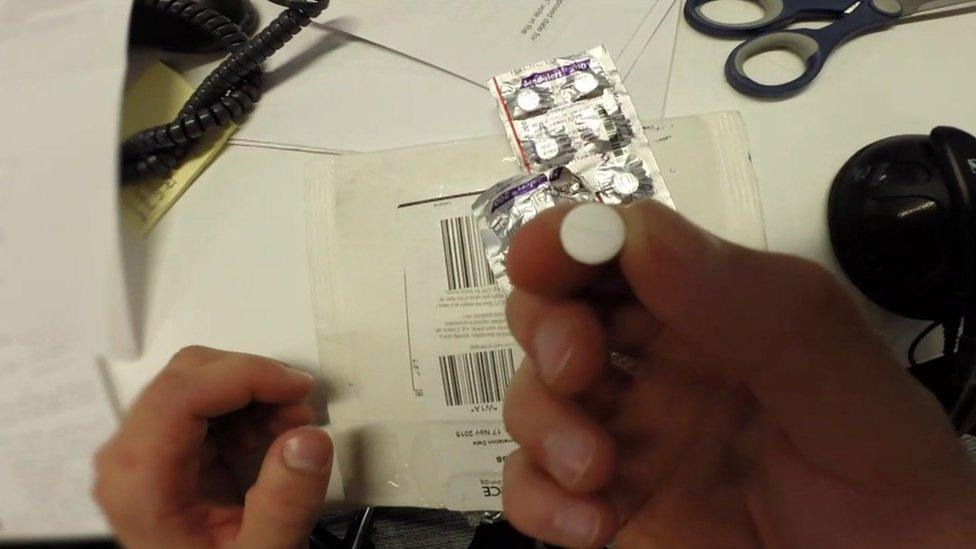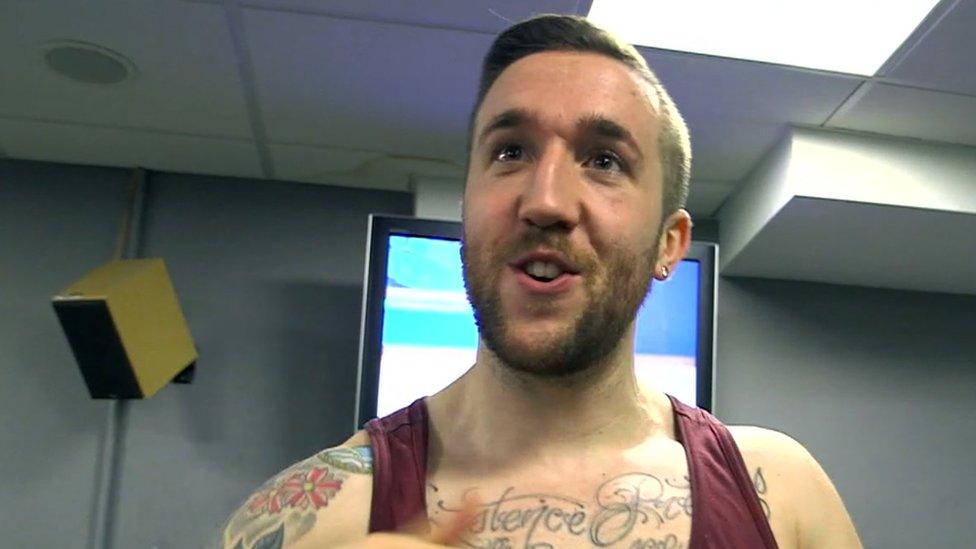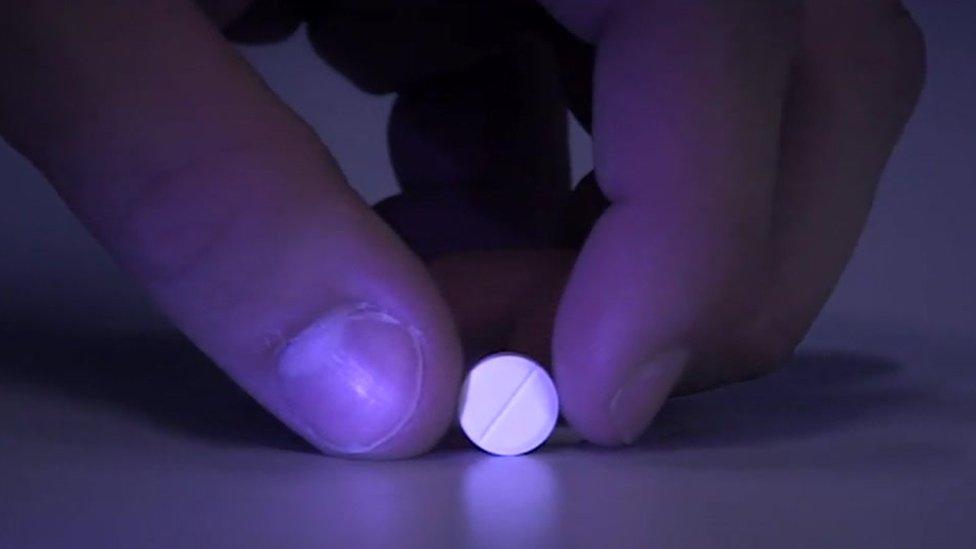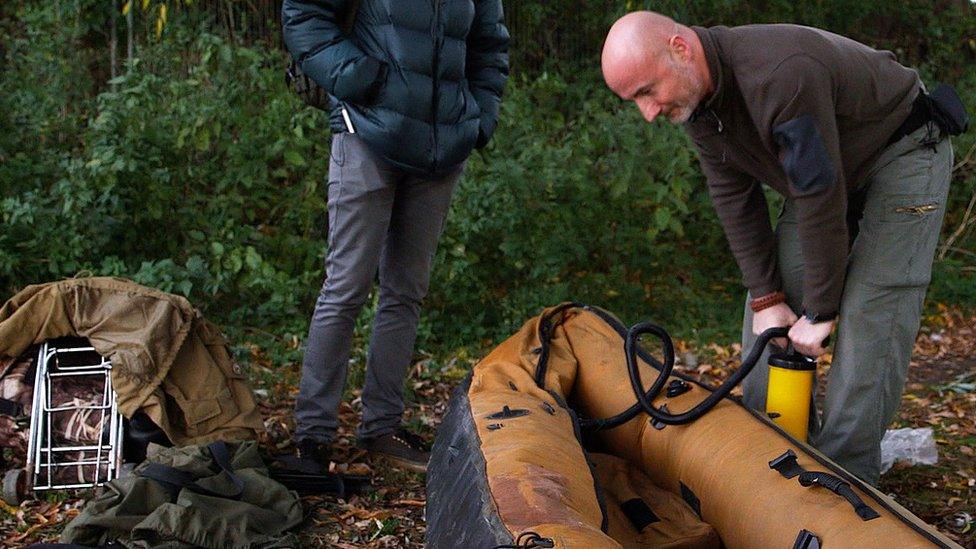My 'smart drugs' nightmare
- Published
Zand struggles with the side effects of taking modafinil
The use of so-called smart drugs is growing in popularity. But do they work?
It was a normal Tuesday morning when my friend first told me about "smart drugs".
"Everyone does it. They're just pills that make you concentrate," she explained. She was taking them to deal with her "big day" ahead.
Many so-called smart drugs have conventional uses - a popular one, modafinil, is used to treat excessive need for sleep caused by narcolepsy or shift work. But they are also being taken, in growing numbers, by people looking to work more effectively.
Modafinil was dubbed the "world's first safe smart drug" by researchers at Harvard and Oxford universities who suggested its effects were "low risk" when taken in the short term. But side effects can include insomnia, headaches and potentially dangerous skin rashes, and there is a lack of long-term data.
Nevertheless, having read such positive reviews online - some claiming smart drugs had drastically improved their university grades - I decided to take it as an experiment.
While it is illegal to sell modafinil in the UK without a prescription, it is not illegal to buy. There are many websites, often based in India, which make it available to purchase - though the UK's Medicines and Healthcare Products Regulatory Agency warn this can be unsafe.
When the package arrived less than a week later, the drugs looked similar to paracetamol tablets.

After consulting a doctor - who said, being young and healthy, it was unlikely I'd have severe side effects - I decided to go ahead.
I took the first pill at the University of Cambridge as part of a cognitive test, where they examined my visual sustained attention, spatial working memory, executive function and episodic memory before and after taking the drug.
Prof Barbara Sahakian was confident the pill would have an effect: "We've done a number of studies that show an increase in cognitive ability when taken - from doctors doing night shifts to healthy people in a controlled testing environment."
Before the pills, my attention was in the top 15-20% of people my age. After, it was in the top 5-10%.
I had certainly begun to feel more awake, and a bit less prone to frustration having taken the drug. But there were a number of other factors that could have affected the results.

Find out more
Watch Benjamin Zand's full film on smart drugs on the Victoria Derbyshire programme website.

My mind, however, stayed alert as the day went on. As I took the four-hour journey back home to Liverpool, I didn't feel a bit of the tiredness I usually would.
But this was the last time I would experience any positivity about taking modafinil.
The following day, a train journey presented what I expected to be a perfect opportunity to get some work done with the aid of a smart pill. I was wrong.
I became distracted - more so than normal. While the drug made me focus, it was on the wrong things - such as playing video games on my smartphone.

Jason Auld is a fan of the drug
As the time passed, I began to develop a very bad headache, I lost my appetite and I needed to use the bathroom - constantly. While my brain wasn't working any faster, my bladder certainly was.
That evening, I began to feel the effects of modafinil's "wakefulness promoting agent". When I tried to get to sleep, I found myself unable to switch off until the early hours of the morning.
I also found an itchy lump on the back of my leg - one on my arm appeared too the following day.
My experiences seemed a far cry from those of others. Jason Auld - an athlete and entrepreneur from Edinburgh - says he feels like he can achieve virtually anything on modafinil.
"It just makes you feel as if you're operating at 100%, you're putting in all you can put in. Usually you don't think that's possible, but modafinil allows me to do it."

Apart from the initial burst of energy and the increased focus I experienced first time around, however, I ended up feeling far from my best.
The third and final time I took modafinil it was also disappointing. With a day of film editing ahead of me, the headaches returned.
I became more and more dehydrated and, once again, I wasn't hungry.
Even worse was the constant reminder from friends at how bad my skin was becoming. As modafinil was preventing me from sleeping, I looked terrible.
Eventually, as the day continued, I stopped procrastinating and the drugs seemed to be having the intended effect. This, though, occurred at about 8pm - when I did not want them to kick in.
I worked endlessly until around 11pm in the office - editing, filming, writing - doing things I didn't even know I needed to do. I felt like I had to continue working, as opposed to wanting to do so.
Zand takes cognitive tests to see if his performance improves after taking the drug
Overall, the negative aspects of taking the drugs far outweighed the positives - which could have been for a number of reasons.
People's bodies react differently to chemicals and tablets, and - after speaking to my doctor - I was told my liver had released an enzyme aimed at flushing the modafinil out of my system.
Having purchased them on the internet, I could also have been taking dud pills - though Jason told me he had used the same supplier before.
In a way, I was disappointed not to have had the chance to feel the positive effects of modafinil I had heard about - but also felt a sense of relief knowing I had not been missing out.
The side effects and lack of productivity meant it was no wonder drug, and I would definitely not be tempted to try them again.

More from the Magazine

British survivalists - known as "preppers" - are fixated on the need to survive in the event of a catastrophe. What motivates them, asks Benjamin Zand.
The British people preparing for the end of the world (October 2015)

The Victoria Derbyshire programme is broadcast on weekdays between 09:15 and 11:00 on BBC Two and the BBC News channel. Follow the programme on Facebook, external and Twitter, external, and find all our content online.
Subscribe to the BBC News Magazine's email newsletter to get articles sent to your inbox.